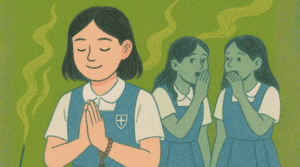This teaching is extracted from a Dhamma talk by Ajahn Achalo, the abbott of Anandagiri Forest Monastery in Thailand. The talk was given in one of the meditation retreats. View the full talk here.
The following is a transcript of the above video with some edits.
Transcript
Many times, what we want from religion is somewhat superficial. Many people want to make offerings so that they can be rich, and many people are not so strict with upholding the precepts. There are even many people listening to Dhamma talks with the want to notice which list of Dhamma that Ajahn talked about – if it’s the 37 wings for awakening, or the 5 powers, or the 5 hindrances, and then they think that’s the lottery number. They’d take down the number and wish to win the lottery. Ajahn Chah sometimes said all these people who come, and they are making the wish: “may I be rich, may I be rich, may I be rich”, he said all they are doing is wishing for more suffering.
A lot of rich people have a lot of suffering. When you become very wealthy, and you’d get a big ego. When you have a lot of stuff, some of them please you, some of them displease you. You can be very attached to comfort, such that the slightest bit of discomfort is very irritating. Hence, being wealthy, being successful doesn’t necessarily mean an increase in happiness. It does give one a certain amount of freedom, but it gives one a lot of headaches as well. Other people want your wealth, you don’t know who you can trust, even your children would be fighting over their inheritance. It can be quite ugly sometimes.
The Buddha taught that greed is like a river. He said, “There is no river that floods like greed.1” It can be boundless if we feed it.
One of the dangers of being too wealthy is that you can feed your greed all the time.
So, the world is a dangerous place in terms of increasing delusion, in terms of increasing kilesa2. And the Buddha taught the middle way – knowing the right amount, knowing moderation, training in contentment. When we train in being contented, it’s like, “Oh! This is what it feels like to be content. It’s really nice, actually.” Actually, contentment is a bit nicer than getting what you want all the time.
When we get what we want all the time, there’s a kind of heat to that, a dizziness, and intoxication. Not very much mindfulness, and there’s a big sense of self. It’s vulnerable. When you get what you want a lot, what happens when you don’t get what you want? A lot of suffering.
There’s a growing understanding that that which knows suffering isn’t suffering. And, there’s a growing understanding that if you really maintain your mindfulness consistently that you’ll start to experience a tremendous sense of peace. And then, if you cultivate wisdom and start to understand the worldly Dhammas you’d understand that praise is just praise, blame is just blame, pleasure is just pleasure, pain is just pain. Fame is just that much. Ill repute is just that much. And you’d find that there’s much less reactivity and more wisdom, and then you realise, “Oh, this is really valuable. This is really worthwhile.”
The Buddha says peacefulness is the highest happiness3.
When the hindrances are weak, when a bad mood evaporates, when you notice impermanence, when you can be with pain with patience, when you can observe things that you used to react to that you’re not reacting to, it’s really nice. A real sense of relief, a sense of coolness, a sense of fullness. That’s why we do these contemplations. They orient us to take responsibility, to contemplate the truth, and to really have a good look inside, and to find that refuge. And when we do that, we’d find that it is very rewarding in a very cool, simple, and natural way.
1. Dhammapada verse 251 – There is no fire like lust; there is no grip like hatred; there is no net like delusion; there is no river like craving.
2. Kilesa – affliction; distress; especially that which afflicts, that which stains; an affliction, a defilement; a defiling passion, especially sexual desire, lust
3. Dhammapada verse 201 There is no fire like lust and no crime like hatred. There is no ill like the aggregates (of existence) and no bliss higher than the peace (of Nibbana).




